Senior cleric says Iran-US talks will remain a 'graveyard dream'
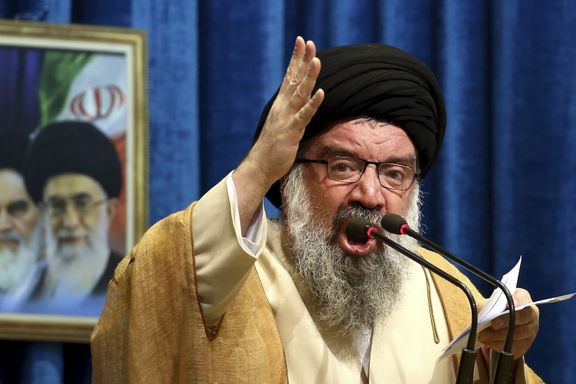
A member of Iran's Assembly of Experts has condemned the idea of potential talks with the US, stressing that resistance against Washington is a core principle of the Islamic Republic.

A member of Iran's Assembly of Experts has condemned the idea of potential talks with the US, stressing that resistance against Washington is a core principle of the Islamic Republic.
"Like Gaza, we too must resist the US," Ahmad Khatami, who also serves as Tehran's interim Friday prayer leader, said on Saturday while speaking at a mosque in Kashan, central Iran.
"I am confident that as long as the people stand firm, they will take the dream of negotiating with the US to their graves," the ultra conservative cleric added.
The US and Iran have not had diplomatic ties since 1980 and in recent days, leaders at Friday prayers across Iran have delivered strong rebukes of US policies.
Earlier, Khatami said that the Islamic Republic's founder Ruhollah Khomeini had labeled the US as the "Great Satan," a sentiment which he said was consistently reaffirmed by Supreme Leader Ali Khamenei.
Khatami argued that the primary aim of the US in seeking talks was "a means to confront the Revolution.”
Ahmad Alamolhoda, Mashhad's hardline Friday prayer leader, has also criticized those advocating for dialogue with the West.
While Iranian hardliners reject overtures from Washington, moderate voices within the country have pointed to potential openings under Trump’s renewed tenure.
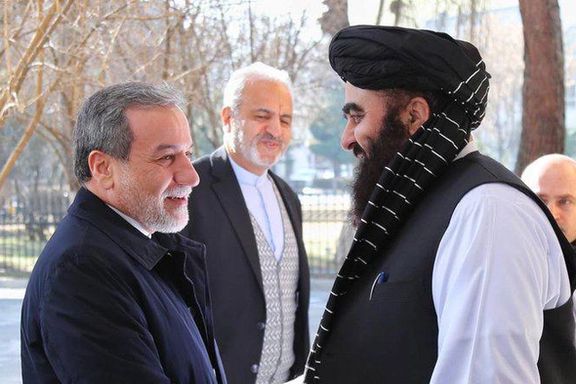
Iran's Foreign Minister Abbas Araghchi traveled to Kabul on Sunday to meet with leaders of the Taliban, the highest level delegation since their return to power in 2021.
IRGC-affiliated Fars News reported that Araghchi met with Mullah Mohammad Hassan Akhund, Taliban's prime minister, and Foreign Minister Amir Khan Muttaqi, during the visit.
The trip is highly significant, with key issues on the agenda including the status of Afghan migrants, water rights disputes, and shared security concerns.
According to Iranian media, the discussions are expected to culminate in a comprehensive cooperation agreement aimed at addressing these critical matters.
The visit has drawn criticism both within Iran and among Afghans. The Iranian newspaper Jomhouri Eslami argued that the trip grants the Taliban undue legitimacy, adding that "no country, including the Islamic Republic of Iran, recognizes them."
Countries including the US, UK and EU, continue to designate the Taliban a terrorist organization.
The paper said that recognition of any Afghan government by Iran is conditional upon holding elections and respecting the will of the Afghan people, which the Taliban have continued to reject, opting instead for a tribal, autocratic system.
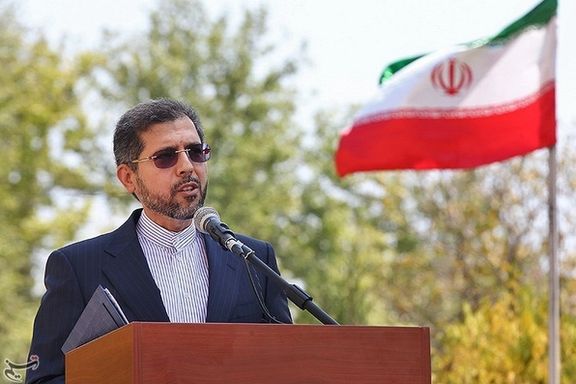
Saeed Khatibzadeh, a senior Iranian diplomat who helped mastermind Tehran's influence operations in the West, has been appointed head of the foreign ministry's think tank, the Institute for Political and International Studies (IPIS).
In 2023, a joint investigative report by Iran International and Semafor combed through thousands of emails from Iranian diplomats, revealing an Islamic Republic network of academics and think tank analysts established by the Iranian foreign ministry to extend Tehran's soft power.
Khatibzadeh, then a Berlin-based diplomat, was the one who proposed in 2014 the formation of the network - called the Iran Experts Initiative - according to the emails.
As a key member of the IPIS, he suggested to his superiors that by forming a network of Iranian analysts in “American and European think tanks”, and offering them “political support”, the Islamic Republic could promote its standpoint in the world.
Iranian former foreign minister Mohammad Javad Zarif had close ties to the IEI, delivered speeches at their gatherings, and communicated directly with some of its members.
Zarif reemerged in Iranian politics last year and was appointed Vice President for Strategic Affairs, hoping to champion new negotiations with world powers regarding Iran’s nuclear deal. Addressing the World Economic Forum in Davos, Zarif said on Wednesday that Iran hoped U.S. President Donald Trump would choose 'rationality' in his dealings with the Islamic Republic.
Khatibzadeh previously served as Iran's foreign ministry spokesman and ambassador to Croatia. His appointment as the head of the IPIS could provide significant firepower to the Zarif's campaign.
"Khatibzadeh played a role in the crafting of the "Iran Experts Initiative," which was used as a malign influence operation by the regime during the JCPOA negotiations in 2013-15. His appointment signals a likely return of similar efforts during the Trump era," said Jason Brodsky, the policy director of the US-based advocacy group United Against Nuclear Iran (UANI).
The mastermind
Iranian foreign ministry emails showed that Khatibzadeh was the mastermind behind the formation of the IEI.
He wrote in an email on March 5, 2014 to Majid Takht-Ravanchi, one of the leading Iranian nuclear negotiators, and Mostafa Zahrani, the then head of the IPIS in Tehran: “This initiative which we call ‘Iran Experts Initiative (IEI)’ is consisted of a core group of 6-10 distinguished second-generation Iranians who have established affiliation with the leading international think-tanks and academic institutions, mainly in Europe and the US.”
On April 14, 2015, Khatibzadeh emailed Zahrani a list of articles and interviews that members of the IEI had published in support of Iran's stance in nuclear negotiations, including Ali Vaez, Ariane Tabatabai, Dina Esfandiary, Ellie Geranmayeh, Adnan Tabatabai, and Rouzbeh Parsi.
Khatibzadeh outlined his accomplishments in an email in 2016, emphasizing his endeavors to “build a network and … engage with think tanks, with a clear focus on the nuclear negotiations to advance Iran's foreign policy, at the highest level” and to “publish dozens of articles in line with” Iran’s foreign policy.
The Iran Experts Initiative (IEI) was “one of the fundamental initiatives of the IPIS”, according to Zahrani. Now, the entity will be run by Khatibzadeh, the mastermind of the Islamic Republic's efforts to influence US foreign policy.
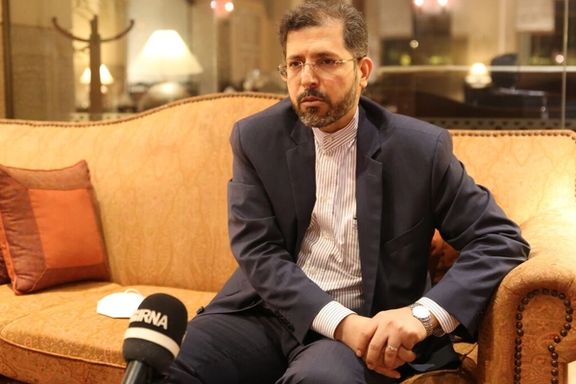
Tabatabai's case
Iran International's 2023 revelations sparked widespread controversy in US political circles, particularly regarding Ariane Tabatabai, a former key aide to former US Special Envoy for Iran, Robert Malley, whose own ties to Tehran were later detailed in a February 2024 investigation by Iran International.
In 2023, Tabatabai was serving as the Pentagon Chief of Staff for the Assistant Secretary of Defense for Special Operations and Low-Intensity Conflict and retained her role and security clearance despite the revelations.
The report prompted multiple congressional investigations, with Republicans raising concerns about her ability to obtain a top-secret security clearance. The Pentagon and State Department said there was nothing in Tabatabai’s background that would have disqualified her from accessing classified information.
In October 2024, she took on a new role in the defense department, which gave her reduced access to intelligence. The Iranian-American academic started overseeing force education and training within former Defense Secretary Lloyd Austin's office.
She left the role this month, according to her LinkedIn profile.
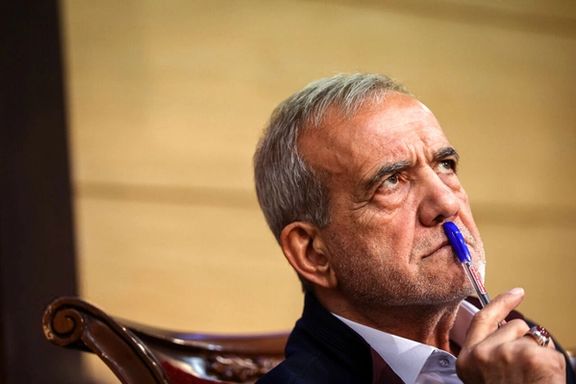
Iran's relatively moderate president, Masoud Pezeshkian, has no plan to run for a reelection in 2028, a reformist newspaper reported on Saturday.
"Masoud Pezeshkian has said in the inner circles of power that he will serve only one term as president and does not intend to run in the next presidential election," pro-government Sazandegi newspaper reported, without giving further details.
The report was released shortly after Pezeshkian and one of his vice presidents posed for photos dressed as construction workers while laying bricks for the construction of a school in Khuzestan, southwestern Iran.
Sazandegi praised Pezeshkian’s brick-laying gesture as "beautiful", but many social media users, including both conservatives supporting the Islamic Republic and dissidents, criticized it as populism.
"The exchange rate for every US dollar has soared to 838,000 rials, and the president is busy shoveling dirt and cement," one user on X quipped.
Another anonymous user, a cleric, commented, "If the previous ultraconservative President (Mahmoud) Ahmadinejad had done the same, the media would have criticized him with all kinds of harsh words."
However, in its Saturday report, Sazandegi countered that the gesture could not be considered populist, as Pezeshkian has no intention of running for reelection.
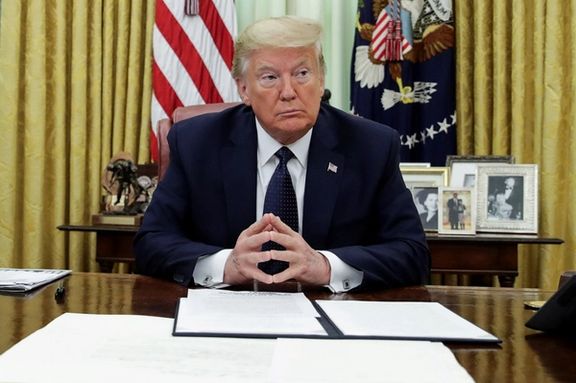
A conservative former Iranian ambassador has noted that some of Donald Trump’s comments, including those on hijab and alcohol, resonate with Muslims. His remarks come as Iran, grappling with a deepening economic crisis, considers the possibility of talks with the US.
Mohammad Hassan Qadiri Abyaneh, former ambassador to Australia and Mexico, described Donald Trump as exhibiting "foolishness and bullying" but said that some of the US president's remarks have "appealed to Muslims."
“Trump opposes homosexuality and drinking alcohol, and he has said, ‘Why should we remove the hijab from Muslim women, who have been dressing like this for centuries?’” Qadiri Abyaneh told ILNA News on Saturday.
While Trump has not made the specific statements the former official referred to, he did criticize American intervention in the Middle East during a 2016 speech. Highlighting a woman’s perspective on wearing traditional coverings, Trump said, “They said, ‘We want to wear them, we’ve worn them for a thousand years. Why would anybody tell us not?’ They want to! What the hell are we getting involved for?”
Regarding Trump’s stance on alcohol, it is well-known that he does not drink. In 2017, he explained the personal reasons behind this decision, citing his late brother, Fred Trump, who struggled with alcoholism and died in 1981 at the age of 43.
On the subject of homosexuality, Trump has enjoyed strong support from the US evangelical Christian community and others. He has consistently criticized political opponents for undermining traditional social norms and family values, a stance that aligns closely with conservative views.
Qadiri Abyaneh also said that Muslims in the United States "did not vote for the Democrats this time due to their support for Israel" and instead supported Trump, a Republican.
According to a survey by the Council on American-Islamic Relations (CAIR), fewer than 50% of Muslim voters backed Kamala Harris in the last election, compared to around 65–70% who voted for Joe Biden in the 2020 presidential election.
Qadiri Abyaneh's remarks come as Iranian officials have appealed for negotiations with Trump to address tensions with Washington and ease sanctions amid a deep economic crisis.
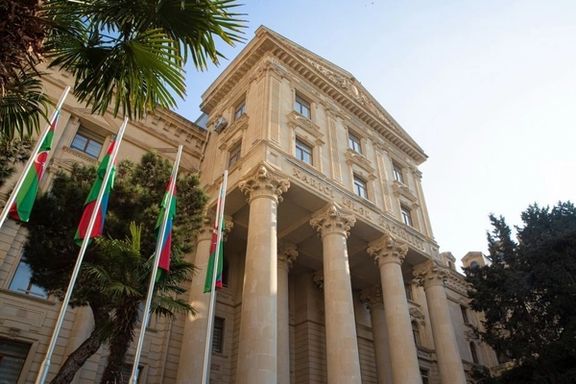
On Saturday, Azerbaijan’s Ministry of Foreign Affairs summoned Jafar Aghaei Maryan, the chargé d'affaires at Iran's Embassy in Baku, to lodge a protest over alleged anti-Azerbaijan content in Iranian media.
According to the APA news agency, Azerbaijani officials raised objections over what they described as a systematic campaign by Iranian media outlets, allegedly close to the Iranian government, to discredit Azerbaijan.
The controversy follows reports that Azerbaijan expelled or barred 16 Iranian female students, accusing them of collaborating with Iranian-linked entities. Iranian state media condemned the expulsions as being aligned with Israel’s policies.
Tensions further escalated earlier in January after Azerbaijan’s security services said they had foiled a plot to assassinate a prominent local Jewish figure for $200,000. Two suspects were arrested, with Azerbaijani officials alleging they acted "under the guidance of a foreign country." While no nation was explicitly named, sources within Azerbaijan’s Jewish community have pointed to Iran.
Meanwhile, on Friday, Mojtaba Demirchilou, an aide to Iran’s foreign minister and director general for Eurasia affairs, met with Azerbaijan's ambassador in Tehran, Ali Alizadeh. During the meeting, Demirchilou protested what he described as "negative actions by certain circles or individuals in Azerbaijan," including the "unethical incident" involving Iranian students. He described these actions as "damaging to relations between the two nations" and called for decisive measures against those responsible.
This development adds to long-standing tensions between the two countries. Tehran has been critical of Baku’s close ties with Israel, while Azerbaijan has expressed frustration over Tehran’s alleged provocations, including inflammatory rhetoric by Iranian clerics and media.
Earlier this month, Azerbaijani President Ilham Aliyev condemned remarks by Iranian cleric Seyyed Hassan Ameli, the Friday Prayer Leader of Ardabil. Ameli accused Azerbaijan of collaborating with Israel and described President Aliyev's policies as part of a "multi-billion dollar gamble with the Israelis." The remarks, aired on IRIB News, also reportedly included insults towards Turkish President Recep Tayyip Erdoğan.
During a press briefing, Aliyev publicly questioned Iran’s leadership over its silence on the matter, demanding an apology. "What is their reaction? Does [the Iranian leadership] support this or not? Who will apologize to Azerbaijan?" Aliyev asked, reflecting the deepening strain between the neighbors.